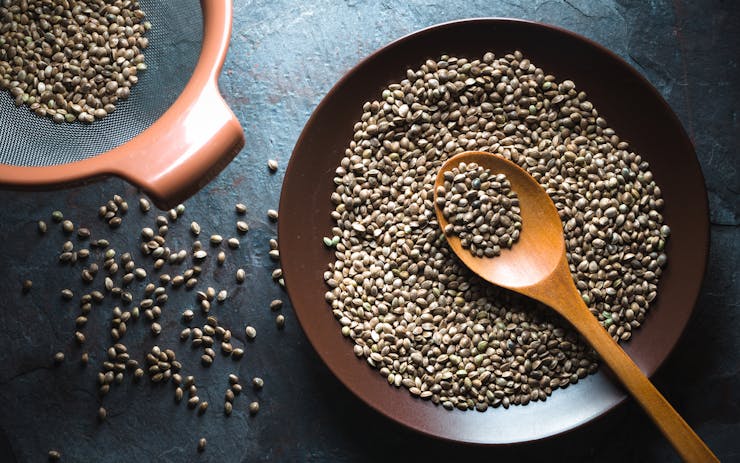Update, 5/2/2018: This story has been updated to include the 9th Circuit ruling’s mention of the federal farm bill, which some in the hemp industry have interpreted to limit the court’s decision.
In a decision likely only to add to the legal confusion around cannabidiol (CBD) in the United States, a federal appellate court in California has rejected an industry challenge to a DEA rule that effectively outlawed the cannabinoid.
The rule, which the DEA published in 2016, established a new Controlled Substances Act drug code for “marihuana extract,” putting even hemp-derived extracts in the same restrictive Schedule I category as psychoactive THC. In doing so, the new rule set the stage for a wave of raids on CBD retailers and related businesses.
While the DEA has said the rule change was an administrative move aimed at better tracking extracts and complying with international drug-control treaties, critics worry it could pose an existential threat to the nation’s burgeoning hemp industry and restrict patient access to CBD, the medically promising and non-intoxicating cannabinoid.
Under federal law, “hemp” is defined as Cannabis sativa plants with less than 0.3% THC. Anything with more THC is “marijuana.” As such, CBD oil from hemp was commonly thought to fall outside Schedule I. But the 2016 DEA rule defined a cannabis extract as “containing one or more cannabinoids that has been derived from any plant of the genus Cannabis” and reiterated that any such substance “will continue to be treated as Schedule I.” Bad news for hemp-derived CBD.
Immediately, lawyers for the hemp industry filed a challenge.
Because none of the parties to the petition filed comments during the DEA rulemaking process, the court wrote, they’re not eligible to challenge the final rule.
The Hemp Industries Association and other hemp-related businesses argued that the DEA overstepped its rulemaking authority by taking an action that effectively added cannabis extracts, and specifically CBD, to the Controlled Substances Act (CSA) without action from Congress. The petitioners cited a 2004 appellate decision that said the DEA has no authority to regulate drugs that were not explicitly scheduled and that parts of the plant are exempt from the definition of marijuana.
On top of that, the hemp businesses claimed, the 2014 Farm Bill included a provision allowing certain states to allow hemp cutivation through pilot projects—and barring federal law enforcement agencies, including the DEA, from interfering.
On Monday, however, a 9th US Circuit Court of Appeals panel rejected the industry’s petition for review. So for now, the DEA rule remains in place.
Bob Hoban of Hoban Law Group, a Denver-based attorney who represented the industry group in the challenge, said he was disappointed by the ruling.
“Given the pervasive confusion and irreconcilable conflicts of the law that have led to product seizures, arrests and criminal charges against those involved in the lawful hemp industry, the Petitioners believe that the Final Rule must be invalidated, absent the Court clarifying and further resolving these conflicts and their severe consequences,” he wrote in an emailed statement.
Part of the court’s decision rested on a technicality. Because none of the parties to the petition filed comments during the DEA rulemaking process, the court wrote, they’re not eligible to challenge the final rule in court.
The DEA began its rulemaking process in 2011, and the final rule on cannabinoids was published Dec. 14, 2016. According to the court, the Hemp Industries Association and other were silent during the comment period. Once the rule was published, however, they “filed the instant petition for review that same day.”
“A party may petition a Court of Appeal for review of a final DEA decision,” the court wrote, “but if the party fails to make an argument before the administrative agency in comments on a proposed rule, they are barred from raising that argument on judicial review.”
The groups challenging the rule, for their part, argued that a comment submitted by a private citizen raised the same concerns. The court, however, was unpersuaded, writing that “Neither this comment nor any other raised with sufficient clarity Petitioners’ current argument that the final rule scheduled a new substance.”
Hoban’s firm says it’s currently working to “carefully weigh” the available options, which includes a rehearing that must be requested within 45 days.
As Hemp Industry Daily reports, that appeal is already in the works. “We will be appealing, and we will be funding that appeal,” Michael Brubeck, CEO of Centuria Natural Foods and a petitioner in the case, told the publication.
Update: Since Monday’s ruling, some in the hemp industry have downplayed the decision’s significance. The US Hemp Roundtable, which describes itself as a “coalition of dozens of hemp companies,” said on Wednesday that the “DEA’s extract rule does not apply to hemp”:
Contrary to some early reports, this ruling does NOT classify hemp-derived cannabidiol (CBD) as a controlled substance, nor does it signify that the popular hemp product is federally illegal. Indeed, the ruling has no legal or practical impact on hemp or hemp products.
The group’s broad interpretation stems from a paragraph in the court ruling about the federal farm bill, which permits some states to grow hemp through pilot programs. In it, the court acknowledged that the farm bill allows for certain parties “to grow or cultivate industrial hemp.” But that provision contains no specific protection for extracts, and the 9th Circuit judges rejected the hemp industry’s argument that the DEA rule violates the farm bill.
In other words, two things are true under the 9th Circuit ruling: First, those permitted under the farm bill to grow and cultivate industrial hemp in the US may legally do so. But second, any “extract containing one or more cannabinoids that has been derived from any plant of the genus Cannabis”—which includes industrial hemp—is now considered a Schedule I controlled substance.
The full 9th Circuit ruling is embedded below:
Hemp Industries Assn. v. US Drug Enforcement Administration — 9th Circuit petition denial by Ben Adlin on Scribd





